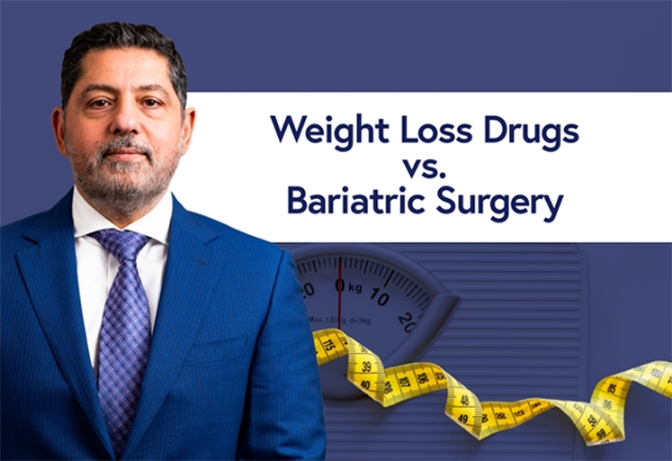Weight Loss Drugs vs. Bariatric Surgery – Which is Right For You?
If you’re trying to lose weight and finding it difficult, you may have considered taking medications or undergoing bariatric surgery. Both of these... read more
Call Us Today (732) 640-5316
E-Waiting RoomNot all overweight people qualify for the gastric sleeve. There are some criteria that must be fulfilled before a patient is approved for surgery. Generally, weight loss gastric sleeve surgery is indicated for morbidly obese adults — that is, people between 18 and 65 years old age, with a body mass index (BMI) of 40 or higher.
People with a body-mass index of 35 — can also qualify. Usually, this requires at least one additional health problem related to obesity. Some common weight-related health conditions include diabetes, sleep apnea, hypertension, asthma and joint pain.
For more information call our NJ weight loss center to schedule a consultation with our bariatric surgery doctors in the tri-state area. We perform hundreds of minimally invasive gastric sleeve surgery expertise every year and our complication rates are among the lowest in the Northeast.
As a guideline, laparoscopic gastric sleeve surgery patients have about a 2-3 week recovery period, (although some can take as long as 6 weeks) before they can return to work.
Bleeding, infection, and blood clots in your legs are possible side effects that may occur after any surgery. General anesthesia may also cause breathing problems or other reactions.
Over time, you may also have some trouble absorbing certain nutrients. Or you may develop a narrowing (stricture) in your stomach sleeve. Some people may have heartburn or reflux after the surgery. If you already have moderate to severe reflux, a gastric sleeve could make that worse. You may want to consider a gastric bypass surgery instead. That type of surgery can stop reflux and heartburn.
You may have other risks based on your health. Make sure to talk with your healthcare team about any concerns before the surgery.
During and after surgery there is little to no pain as a result of anesthesia and pain medications. After Day 1 of recovery is when pain is typically more noticeable. The anesthesia has worn off, and while your pain medications are working, you’re also moving a bit more. When you turn your trunk, pain is evident. Fortunately, pain should be bearable. After Day 2 pain is still bearable for most people. Patients often experience the most pain between days 3 and day 6. Pain during days 3 to 6 is common because you are up on your feet more, turning your trunk more, and generally more active than before. After Week 1, you may still experience pain, but pain should be manageable with simple over the counter medications.
I had surgery in 2017. I am so happy with the decision I made. The doctors were great answered every question I needed. and the front desk were also great. They are super friendly!
Sara C.Weight loss is one of the goals of bariatric surgery. The amount of weight loss will depend on the person and the procedure. But it tends to be rapid in the first few months. During the first 30 days after bariatric surgery, the average weight loss is 5 to 15 pounds per week. Men tend to lose weight at a faster pace than women. By two months, most people average a 20% loss of excess weight.
After six weeks you should be able to resume a normal solid food diet. Your gastric sleeve will allow you to eat almost any type or texture of food. You should aim for three well balanced meals each day.
Managing hunger after weight-loss surgery is one of the most daunting parts of post-bariatric life. In almost every case, except some gastric sleeve post-ops, patients may still feel hungry even if they are full after a meal. This arises because, while the stomach is smaller, the brain may still be used to the patient’s past lifestyle and diet.
This hunger, especially in the first few months after surgery, can make it very difficult to stick to the post bariatric diet and can be a nagging reminder of the lifestyle and diet challenges after weight loss surgery.
The gastric sleeve is slightly different however, because part of the stomach is cut away and removed from the abdomen. The fundus, which produces hunger causing hormone ghrelin, is removed along with the stomach. This causes significantly reduced hunger sensation in many patients.

Dr. Ragui Sadek is a premier surgeon who established a state-of-the-art and one of the safest bariatric surgery programs in the state. Dr. Sadek has fellowship training in both laparoscopic/bariatric surgery and surgical trauma/critical care, allowing him to safely perform complex surgeries on patients who have been turned down by other practices. As a Clinical Assistant Professor of surgery at RWJ Medical School & the Director of bariatric surgery program at RWJ University Hospital, Dr. Sadek offers a cutting-edge range of laparoscopic, robotic, & bariatric surgical procedures with a complication rate substantially below the national average.
Dr. Sadek is a Clinical Assistant Professor of Surgery at Rutgers-Robert Wood Johnson Medical School and a Fellow of the American College of Surgeons. Having performed more than three thousand advanced surgical procedures, Dr. Sadek has established a strong patient satisfaction rate and a solid reputation among the surgical community and is renowned as a top physician in his field by International Association of Healthcare Professionals. As a board-certified surgeon, he holds affiliations with the American Society of Metabolic and Bariatric Surgery and the Society of American Gastro Endoscopic Surgeons. More about Dr. Sadek
Stay current with Advanced Surgical & Bariatrics of New Jersey

If you’re trying to lose weight and finding it difficult, you may have considered taking medications or undergoing bariatric surgery. Both of these... read more

Are you frustrated with your inability to lose weight? Tired of being trapped in an endless cycle of yo-yo dieting, over-exercising, cleanses, and... read more